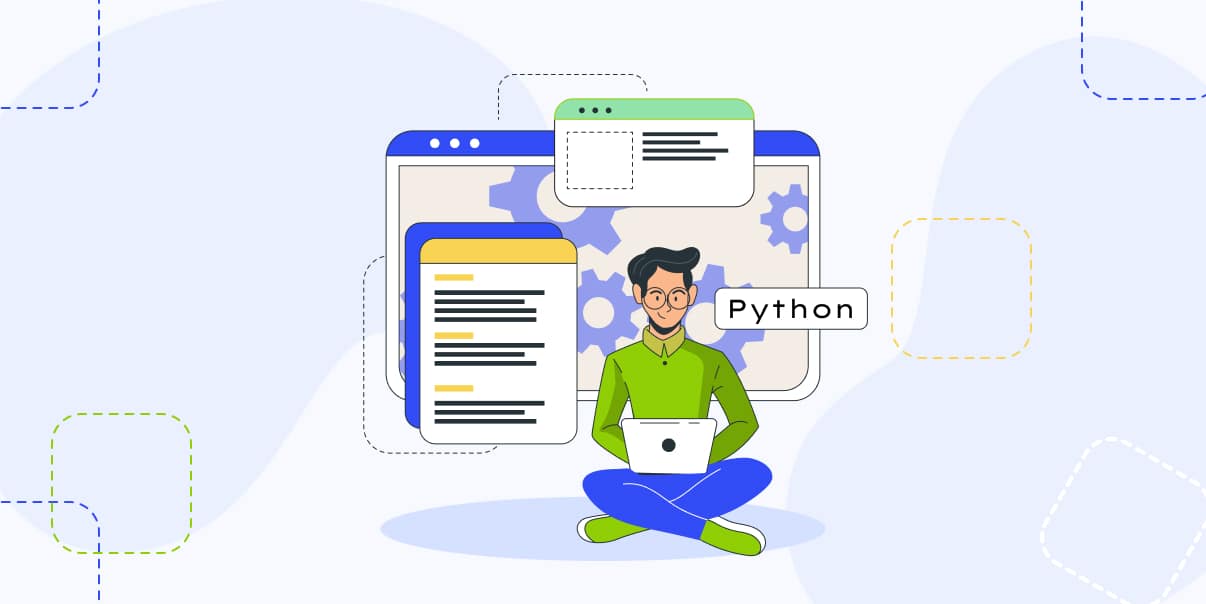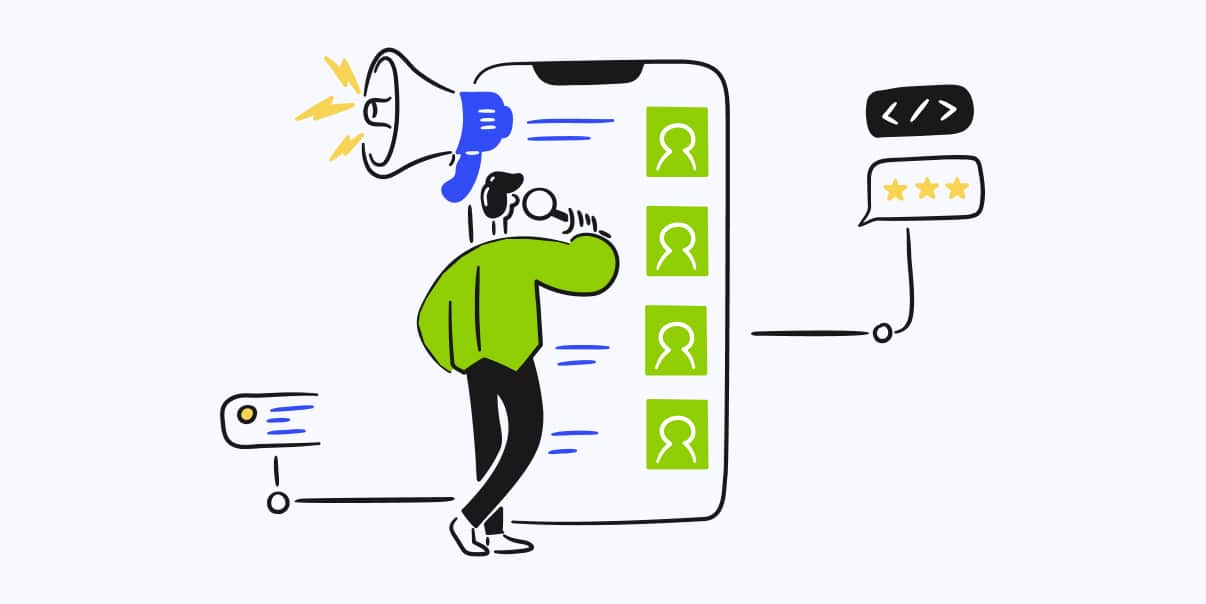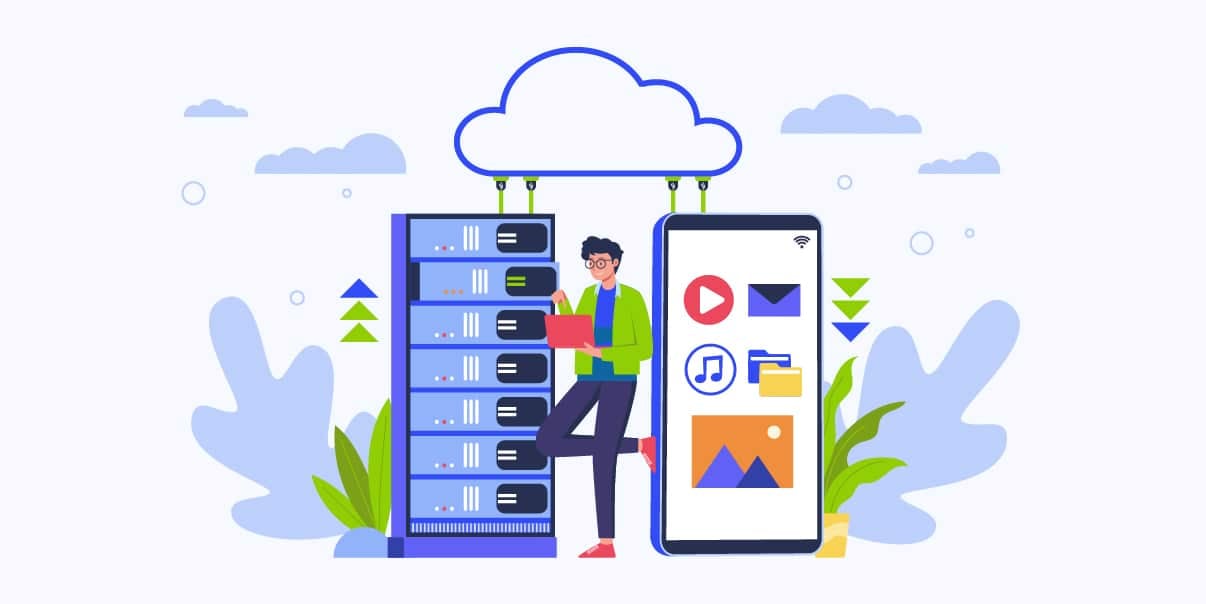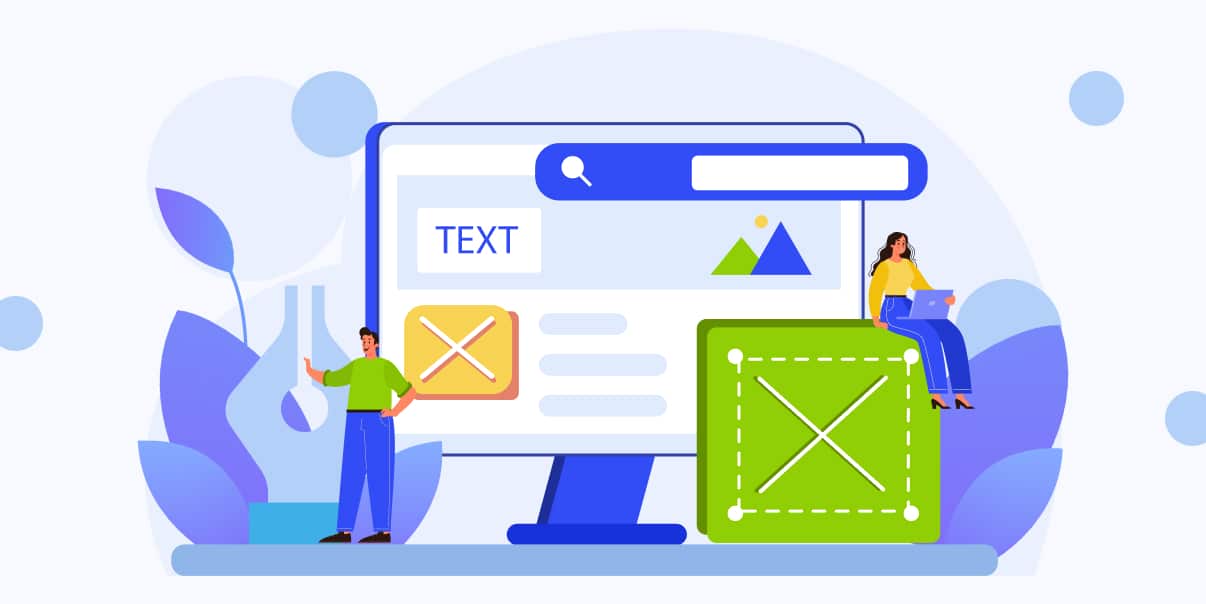Python for Mobile App Development: All You Need To Know

Python is a high-level programming language that reads like English. It makes coding simpler than other popular languages like Java or C++. Its language is excellent for beginners in coding because of its easy-to-understand syntax. You can build powerful apps with stunning visuals and interactive features with Python.
Python is versatile and compatible with many platforms, including Android and iOS. You can develop custom apps from scratch or use existing frameworks to get started quickly. Python can create business management, machine learning, command-line, and audio and video apps.
Setting up a Python Development Environment for Mobile App Development
Here are the steps involved in developing mobile apps using Python. This article will guide you from choosing the right tools to testing and deployment.
Planning the Prerequisites
Before making mobile apps with Python, ensure you have everything ready first. Then, think about which device or platform the app should work on and what app it needs.
Decide what database to use and any other essential details for the project. Make sure you plan and get everything in order before getting started.
Prototyping and Wireframing
Once you have planned out the prerequisites, the next step is to create a wireframe or prototype of your project. It will help you design your app’s user interface and workflow before coding. You can use tools to create an interactive prototype that you can test with actual users. Adobe XD, InVision, and Mockplus are great options for creating prototypes.
Coding With Python
The next part is coding with Python. Various tools are available to develop mobile apps with Python. Each tool comes with advantages and disadvantages. The most popular ones include Kivy, Django, Flask, CherryPy, and Falcon. You can choose which one to use based on your project’s requirements. For instance, Kivy is better suited for game development and Django for web apps.
Choosing the Framework
After you have chosen the right tool for your project, selecting a framework is next. Frameworks make it easier to develop mobile apps by providing pre-written code and libraries for your project. Some popular Python frameworks are Pyramid, Django, Flask, CherryPy, and Falcon.
Launching the Application
Once you have coded the application and tested it, the next step is to launch it. It includes setting up the necessary servers and deploying your code to them. You can use Heroku or Amazon Web Services to deploy your app. They provide managed servers to deploy your code with a few clicks.
Popular Python Mobile App Development Tools
Python has a variety of tools available for mobile app development. Here are some of the popular ones:
Kivy
Kivy is an open-source Python library that lets developers create user interfaces and apps. It can create desktop apps, game development tools, Python GUI frameworks, and robotic control. You can also build apps with modern design elements, great user experience features, and robust performance.
Django
This open-source web framework lets developers create custom designs using advanced features. You can also use the built-in ORM layer for data access. Django offers a robust security system to protect mobile apps from malicious attacks. Plus, it’s free and open source, so there’s no licensing fee.
BeeWare
This tool lets developers write a single code for Android, iOS, and Windows platforms. Its extensive library of APIs makes it easier to use location awareness or integrate with other services.
Bottle
Bottle is a lightweight Python web framework used to create web applications. It’s an excellent choice for businesses looking to start small and scale up as the project grows since it’s optimized for speed and efficiency. Since it uses Python, many valuable libraries are available for developers. They add extra features such as authentication, ORM layers, and more.
CherryPy
CherryPy is a simple-to-understand tool with built-in HTTPS support, session, and cache tracking. Its routing system helps organize the code into classes and functions, making larger projects easier to manage. You don’t need to worry about long code files or outdated libraries.
Falcon
Falcon has helpful tools like an HTTP server and support for multiple platforms. These tools help make sure everything is correct. It even has extra security features to protect your work. Falcon also has features for authentication, content types, establishing secure connections, and rate-limiting. These features ensure no one overuses the system.
Flask
Flask makes web development quick and easy. It lets you focus on getting great results instead of writing lots of extra code. It has a development server and the Jinja2 templating system for creating HTML5 pages. You can also use Flask to build APIs and make interactive websites using AJAX.
Pyramid
This powerful development program has lots of great features. They include an object-relational mapper, HTML templating, and authentication options. It works well with multiple databases, making complex apps easier to develop. Its debugging tools, tutorials, and precise documentation make Pyramid popular among developers. Plus, you can use its advanced setup system to get what you need.
Key Features of Python That Make It a Strong Choice for Mobile App Development
Python is an excellent choice for mobile app development due to its superb readability and intuitive syntax. Hence, Python makes coding easier for developers of all levels. Here are some reasons why 15.7 million developers use Python for mobile app development:
- Excellent readability. Python has a simple syntax that is easy to understand and read. Because of this, it’s easier for developers to write Python code quickly.
- High-level security. With the help of secure libraries such as Kivy, PyQt, and Django, Python provides your app with high protection.
- Modular approach. Python enables you to use modules that break down complex applications into smaller components. This approach makes the mobile app development process easier and faster.
- Fast response time. Python offers a quicker turnaround than other programming languages. Python app development is best, which requires immediate and efficient data processing.
- Comprehensive libraries. Python has many useful libraries for various tasks. It has libraries for networking, graphics, and GUI. Its custom UI toolkit and extensive libraries make it easier to create complex apps quickly.
- Ease of integration. You can easily integrate your existing code written in C++ or Java into Python. The cross-platform Python framework makes it easy to scale up your apps with minimal effort.
Examples of Successful Mobile Apps Developed With Python
Several mobile applications use Python. Here are some examples:
- Dropbox: This cloud storage service created with the Flask framework lets users store and manage their files online.
- Quizlet: This educational app uses Kivy and Django for its user interface.
- Instagram: This popular social media platform uses Python to power its backend infrastructure.
- Spotify: The streaming service uses Python for data analysis and machine learning tasks.
- Pokemon Go: It’s an augmented reality game that uses the Kivy framework for its user interface.
- Instacart: This grocery delivery app uses Python for backend development and data analysis tasks.
- Pinterest: This popular social media platform uses Python to power its backend infrastructure.
- Uber: The ride-hailing app uses a Python framework.
- Quora: A question-and-answer website built with Python using the Django framework.
- Facebook: The social media giant uses Python and machine learning algorithms for data analysis.
- Reddit: The popular online forum uses Python for its web and mobile app development.
- Netflix: The streaming service uses Python for data analysis and backend development.
- YouTube: The video streaming platform uses Python for its backend infrastructure.
Pros and Cons of Python for Mobile App Development
Advantages of Using Python for Mobile App Development
1. It is multi-purpose.
Python is a type of computer language used for many things. It can help create websites, games, and desktop apps. It works on many different types of computers and mobile devices. With its extensive library of modules, developers can easily extend their existing code base. They don’t need to rewrite the entire program from scratch.
Also, since Python is an interpreted language, it makes debugging quicker. It’s ideal for mobile development, where testing apps on multiple devices is necessary.
2. It improves the developer’s productivity.
Productivity is an essential aspect of web projects. Python’s ideology follows specific conventions and avoids time-consuming, repetitive tasks. Reusing templates and modules saves time. The simple syntax streamlines the entire development process.
3. It is part of the LAMP stack.
LAMP is a well-known collection of web technologies used to develop mobile apps, websites, and web apps. LAMP stands for Linux, Apache, HTTP, MySQL, and Python.
Although the ‘P’ initially stood for the web language PHP, Python has surpassed it as the top choice. The LAMP stack is a popular web solution. For various reasons, most businesses prefer LAMP for website and software development.
Disadvantages of Using Python for Mobile App Development:
1. Its performance can be better.
While Python is a powerful language, it has limited performance compared to Java and C++, which are primarily used in mobile app development. Your apps may take longer to run or be slower than those written in other languages.
2. It has high memory consumption.
Apps built with Python can consume a lot of memory due to the high-level abstraction layer. It makes apps less efficient when working with large data sets or extensive calculations.
3. It is platform-dependent.
Due to their platform-dependent nature, Python apps are not compatible with all operating systems. Also, certain features may not work when running on different platforms.
4. It does not work with native apps.
Python is an interpreted language. To become functional, you must run the code through a virtual machine or interpreter. Hence, it has slower performance and longer loading times than those written in other languages.
5. It has a limited developer pool.
Python mobile app development requires specialized knowledge of the language & framework. Because of this, a limited pool of potential developers is available for hire compared to more popular development options like Java or C++.
Best Practices for Using Python in Mobile App Development
Here are some standard python development practices developers should keep in mind:
1. Choose a Framework
Several Python frameworks make mobile app development easier and faster. These include Kivy, Django, Flask, CherryPy, and Falcon. Do your research first to decide which is suitable for your project requirements.
2. Test Your App
Ensure your app works on different platforms and mobile devices before publicly launching it. This way, developers can catch any bugs or issues in advance rather than after release, which could cause more problems if not fixed quickly.
3. Get Gamiliar With the Many Free Python Libraries
There are several free python libraries for different tasks. There are libraries for networking, graphics, and graphical user interface. Knowing these libraries can speed up the development process. It makes creating a robust mobile application easier.
4. Use Logging and Debugging Tools
Use logging and debugging tools to ensure your code is working correctly. Pylint and PyCharm are examples of good debugging tools. They help identify any issues or bugs in your code early in development so you can fix them quickly.
5. Start Small and Optimize Later
When starting with Python for mobile development, start small. Create basic prototypes before adding more complex features. It will help you understand the language and ensure your app runs smoothly before adding more advanced elements.
6. Use Cloud Services
Use a cloud service that provides managed servers for quick deployment and easy scaling of applications.
7. Utilize Database Platforms
Python is compatible with many database platforms, such as MongoDB and PostgreSQL. It allows developers to store and retrieve data securely.
Things To Consider When Using Python for Mobile App Development
Python is a powerful language with many advantages for mobile app development. However, here are some factors you need to consider before diving in.
Platform Compatibility
As Python is platform-dependent, the apps you create may not be compatible with specific devices or operating systems. Ensure your app works correctly on all platforms before launching it.
Complex Syntax
Although Python has a simple syntax, building large apps can become more complex. Big apps require multiple libraries and modules to be integrated for the code to function correctly. Debugging and troubleshooting take longer due to the number of components needed.
Security Risks
Python is open source so malicious actors may find ways into your app through security flaws. Therefore, it is vital to ensure your code is secure through testing. Identify and address all potential security risks before launch.
Alternative Programming Languages for Mobile App Development
Developers can use alternative programming languages in mobile app development instead of Python. These include:
- C++ is a strongly typed language that offers high performance for complex applications but can be challenging to learn and debug.
- Java is a programming language widely used in mobile app development. This language offers excellent support for object-oriented programming, debugging, and scalability. Java’s features make it ideal for developing large-scale applications.
- JavaScript is another popular language used to create interactive web pages and apps. It’s easy to use, making it great for prototyping. However, it lacks certain features, making it less suitable for larger applications.
- Swift is a language created by Apple and used mainly to develop iOS apps because it is easy to learn. It supports alternative programming paradigms like functional and reactive programming. Hence, it is ideal for building mobile apps on the iOS platform.
- Kotlin is a modern language developed by JetBrains. It is considered an alternative to Java. It offers better performance while still being compatible with the Android platform.
Each language offers benefits depending on the application type you want to build. It’s important to research which would suit your project best before making a final decision.
Conclusion
It’s undeniable that Python is a powerful tool for mobile app development services. It’s known for its simple syntax, comprehensive libraries, and fast response time. No wonder it’s the preferred language of many mobile application developers. However, as with any programming language, there are certain drawbacks. Python has limited performance and platform dependencies. Therefore, research before deciding which language to use for your project is crucial.
Working with developers with extensive skills and experience in Python is essential. BIT Studios, a renowned Python Development Company, has a vast pool of talents you can tap for your Python development project. We offer software and mobile app solutions tailored to our client’s needs. Schedule an appointment to discover how we can turn your project ideas into reality.
We’re BIT Studios!
At BIT Studios we specialize in designing, building, shipping, and scaling beautiful, usable products with blazing-fast efficiency



